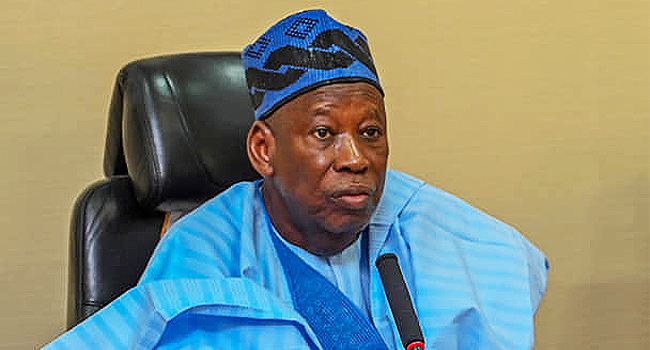Politicians must ensure judiciary’s freedom from external influence – Ganduje
The National Chairman of the All Progressives Congress (APC), Dr Abdullahi Umar Ganduje, has urged politicians and other stakeholders in the democratic process to ensure the judiciary remains free from external influences. Speaking at the first Inter-Party Advisory Council (IPAC) roundtable in Abuja, themed “The Role of the Judiciary in Nigeria’s Democratic Sustainability,” Ganduje emphasised […]

Ganduje
The National Chairman of the All Progressives Congress (APC), Dr Abdullahi Umar Ganduje, has urged politicians and other stakeholders in the democratic process to ensure the judiciary remains free from external influences.
Speaking at the first Inter-Party Advisory Council (IPAC) roundtable in Abuja, themed “The Role of the Judiciary in Nigeria’s Democratic Sustainability,” Ganduje emphasised the importance of an independent judiciary for a thriving democracy.
Ganduje stated, “As political leaders, we must support efforts to enhance transparency, accountability, and integrity within the judiciary to promote democratic sustainability. An independent judiciary is crucial for upholding justice, fairness, and the rule of law.”
He said that transparency and accountability are essential for building public trust in the judicial system, adding that “stakeholders in the democratic process must ensure that the judiciary remains free from external influences and interference.”
- FG to pay Julius Berger N280bn to complete Abuja- Kano highway
- FG suspends plan to sell N40,000 subsidised rice to civil servants
The former Kano State governor also pointed out the need for reforms across Nigeria’s democratic institutions, including the Independent National Electoral Commission (INEC), the judiciary, and security agencies.
He stressed, “Leaders come and go, but institutions remain. Strong institutions are vital for the country’s stability.”
A former senator for Kaduna Central, Shehu Sani, who also spoke at the event, condemned the reluctance of Nigerian presidents to pursue electoral reforms due to concerns about their political futures.
He commended former President Goodluck Jonathan for his commitment to reforms, noting that, “Jonathan introduced significant electoral reforms, including appointing an INEC chairman he had never met.”
Sani questioned why other democratic institutions, such as political parties and INEC, did not share the judiciary’s reputation as the “last hope of the common man.”
“We desire a perfect judiciary in a perfect system, but every political party’s executive is influenced by someone. From congresses to general elections, the process is far from ideal,” he said.
Alhaji Yusuf Mamman Dantalle, IPAC National Chairman, emphasised the judiciary’s role as the stabilising force in Nigeria’s democracy.
“The court is the temple of justice, and its ministers must be upright, dispensing justice impartially,” he said.
Dantalle also called for urgent judicial reforms, citing recent controversial judgments that have eroded public confidence in the judiciary.
He warned that the current situation, marked by conflicting court orders and perceived miscarriage of justice, threatens the integrity of Nigeria’s judicial system.
“There seems to be anarchy in the temple of justice. This development has led to a public lack of confidence in the administration of justice in Nigeria. Urgent reform is needed to restore the judiciary’s integrity and honour,” Dantalle also said.
